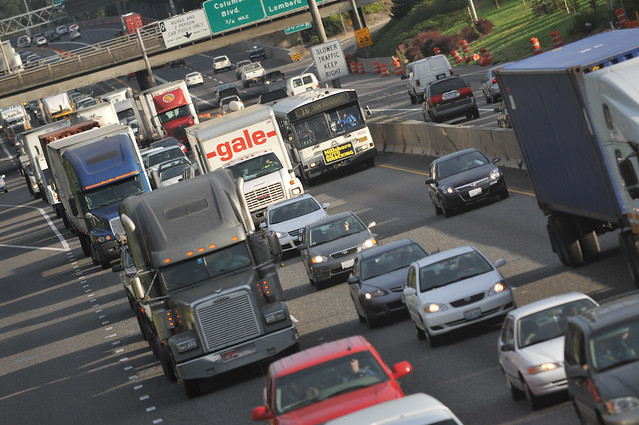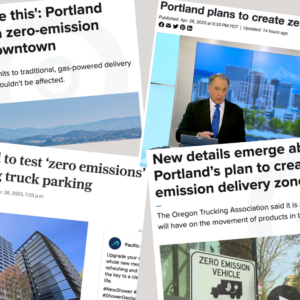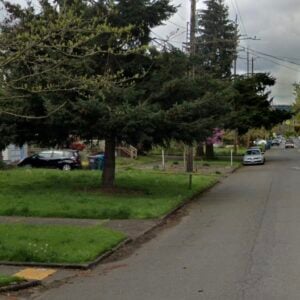Thursday on the political blog BlueOregon, veteran Portland transportation wonk Ron Buel warned Oregonians eager for a gas tax hike to be careful what they wish for.
Though there’s almost universal consensus among Oregon Democrats that human-caused global warming is a catastrophic threat to the state, Buel writes that
It’s also an article of Democratic Party faith in Oregon that our highway infrastructure needs to be built out at breakneck speed in order to deal with growing congestion on the state’s highways, so that our economy can thrive. The annual Oregon Business Summit, held earlier this year, attended by thousands of businessmen, and capturing our leading politicians of both parties to speak there, recently proclaimed this congestion as the state’s number one issue. The Democratic Party in Oregon seems led by the nose by unions who also love that argument, including particularly the building trades and the AFL-CIO, who are dying for these local union highway construction jobs that used to be so numerous but have virtually disappeared as people drive less and drive vehicles that use less gas per mile.
Advertisement
Buel goes on to draw a line between roadway maintenance, which he supports, and roadway construction, which he doesn’t.
Based on the support of leading Democrats, and also based on their first-time-around legislative success on the Columbia River Crossing, a substantial increase in the gas tax to fund many highway construction projects is very likely to pass in this session. We’re not talking just funding existing infrastructure maintenance (like re-paving highways) at a higher level, which seems to everyone like a good idea as our highways fall apart. We’re talking about freeway and highway expansion that is otherwise stymied, idling not only the highway construction industry, but also the union construction workers, and the many engineers in the Oregon Department of Transportation ranks whose jobs also depend on designing new construction. …
President Barack Obama, in his recent State of the Union speech, picked an infrastructure support path that specifically didn’t include road and freeway expansion. He said
“21st century businesses need 21st century infrastructure – modern ports, stronger bridges, faster trains and the fastest Internet. Democrats and Republicans used to agree on this. So let’s set our sights higher than a single pipeline. Let’s pass a bipartisan infrastructure plan that could create more than 30 times as many jobs per year, and make this country stronger for years to come.”
Buel doesn’t offer any advice here on how or whether it’d be possible to raise the gas tax in such a way that it isn’t channeled into destructively large roadways. But this post is billed as the “first column in a four-part series on climate change and Oregon transportation policy,” so I’d expect further posts to tackle that.
Buel’s antipathy for trade and construction unions, which was honed during his long fight against the Columbia River Crossing, makes many of his fellow left-leaners uncomfortable. But it’s worth noting that if you were really trying to maximize construction jobs, you’d actually build lots of biking infrastructure — it’s the most labor-intensive type of infrastructure there is, followed by walking infrastructure.
For Oregon Democrats, this legislative session is a rare opportunity for many reasons. The party has almost complete control of government, with big majorities in both houses, and it can easily put ballot issues to what’s likely to be a very liberal electorate in the November 2016 presidential election. Expect people with strong opinions, like Buel, to keep making noise about how the party should use this moment.








Thanks for reading.
BikePortland has served this community with independent community journalism since 2005. We rely on subscriptions from readers like you to survive. Your financial support is vital in keeping this valuable resource alive and well.
Please subscribe today to strengthen and expand our work.
They should have a test: If you can’t define “induced demand” you can’t vote for expansion.
“It’s also an article of Democratic Party faith in Oregon that our highway infrastructure needs to be built out at breakneck speed …” Ron Buel
Buel goes way over the top, I think, in assuming that the Oregon Democratic party regards highway build out in the regard he suggests. I think he’s wildly blurring lines between what some union people would like to happen, and rank and file members of the ODP believe is necessary to to keep Oregon moving with the times.
Talk to ordinary people, and they say things like: ‘many roads are in terrible condition, many bridges are old and in danger of falling down, and freeways are already too big and too many’. There’s plenty of work for engineers, repairing infrastructure the state already has. Increased paving over of Oregon land for freeways, obliterates Oregon country, and adds to, not restrains, congestion.
“…But it’s worth noting that if you were really trying to maximize construction jobs, you’d actually build lots of biking infrastructure — it’s the most labor-intensive type of infrastructure there is, followed by walking infrastructure.” andersen/bikeportland
I think the extent to which Oregonians, Democrat or otherwise, support bike infrastructure, depends in no small part upon what this type of infrastructure can do, or has the potential to do to sustain the Oregon economy on a degree that motor vehicle use on roads does. Keeping union workers employed is nice, but it’s absurd to imply that all the people living in Oregon that are Democrats, are willing to spend scarce money to build a bunch of stuff of dubious value to their health and the towns they live in, just to keep union workers employed.
It did strike me as the kind of anti-union speech usually coming from the Right.
Correction: “… Buel goes way over the top, I think, in assuming that the Oregon Democratic party regards highway build out as he suggests it does. …” wsbob
Do an images search on “way over the top” or “former mayoral advisor past pull date”. Either way, Buel’s picture is near the top of the results.
Worth considering, wsbob, is the extent to which what “rank and file members of the ODP believe” differs from “what the state Democratic Party does.” I think that much of that difference has to do with the influence of powerful interests, including unions. What do you think?
Definitely some conflicting, values, motivations and priorities between union rank and file and union management. That’s something Ron Buel ought to be well aware of.
I think a ballot measure to change the Oregon constitution could be successful if it’s tied to a state plan on climate change solutions. For example, if there is a plan that identifies that we need to increase mode share of non-auto trips to 30%, then the ballot measure should identify what percentage would go to non-SOV modes. Otherwise, I fear the measure will be seen as opening a pandora’s box that will fully deplete road maintenance coffers. There’s gotta be some balance. If so, I think Oregonians are smart enough to support it.
Link on “it’s the most labor-intensive type of infrastructure there is,” is broken.
You’re right! Here it is.
http://www.peri.umass.edu/236/hash/64a34bab6a183a2fc06fdc212875a3ad/publication/467/
December 23, 2014 at 4:15 pm
I think Ron Buel has a highly distorted view of transportation agencies’ needs and priorities and ODOT’s staffing and expenditures.
Transportation agencies, including ODOT, spend relatively little money on what Ron calls “freeway and highway expansion.” If you look at ODOT’s budget document and the Statewide Transportation Improvement Program, you will see that substantial portions of ODOT’s budget go to rail, pedestrian/bike, and transit programs.
A major portion of the highway program is devoted to maintenance, including mundane items such as paying for operation of street lights and traffic signals, replacement of worn out or damaged signs, cleaning out culverts, sweeping, etc. Maintenance also includes pothole repair and repaving. Relatively small amounts of ODOT’s budget goes to major construction activities and few of those actually include significant widening or expansion of capacity for autos. Consider, for example, all the money spent on environmental projects, such as replacing failing culverts with fish-friendly short-span bridges. Those cost lots of money, don’t cause a highway capacity expansion or induce demand. In fact, those can be the key to getting a wide shoulder for bikes on rural highways.
Even such projects as the Pioneer-Eddyville modernization project, which will cost hundreds of millions of dollars, doesn’t really increase capacity for autos and trucks. It will make it much easier and safer for users of all modes of transportation to traverse US 20. That’s a section of highway that has no shoulders today. Personally, I don’t mind making it easier for motorists and truckers to negotiate that section of highway because without that project it is absolutely unsafe for cyclists in its current condition.
Buel also seems to think that the only role for ODOT engineers is in new construction. He fails to understand the critical role of engineers in operations and maintenance and in minor projects. Even those activities require qualified engineers to produce the plans and specifications for construction. It’s also worth noting that the design work for major ODOT project is mostly contracted out to private engineering firms. ODOT simply doesn’t have enough qualified engineers to undertake a major program of highway expansion using internal staff. ODOT contracted both the management of and the design work related to the highway bridge replacement program.
As I’ve stated on this forum previously, using 1993 as a base, the Oregon gas tax would need to be 42 cents per gallon today to make it equivalent in buying power from 1993. I’ve lived in Oregon for more than 30 years and I certainly don’t remember the 1980’s as a period of massive highway expansion in Oregon. Returning to that level of funding (adjusted for inflation) won’t produce a great surplus of money. I seriously doubt that increasing the Oregon gas tax by 10 or even 20 cents per gallon would produce the massive expansion of highways that Buel fears. Most of the money would surely go to correcting issues resulting from deferred maintenance, and selective improvements would be implemented. It would probably also result in ODOT turning over highways such as Barbur to cities.
I completely disagree with Buel’s concerns about transportation funding, which appear to be more in line with Grover Norquists’ starve-the-beast approach to government in general. With more money, I think we’ll be in a position to actually implement a balanced transportation system and that those of us who prioritize “active transportation” will get a really significant share of the resources spent on our priorities.
http://usa.streetsblog.org/2015/02/05/more-money-wont-fix-u-s-infrastructure-if-we-dont-change-how-its-spent/
“throwing more money at the problem overlooks the fatal flaw in American transportation infrastructure policy: The system is set up to funnel the vast majority of spending through state departments of transportation, and those agencies have an absolutely terrible track record when it comes to making smart long-term decisions.”
“throwing more money at the problem overlooks the fatal flaw in American transportation infrastructure policy…”
Two things are interesting about that statement. I would argue we have a very similar problem with respect to several other major sectors in the US: healthcare and education being just two of the ones I’m somewhat familiar with. Our cultural predisposition is to look everywhere for more money. Yet we rarely take time to ask whether the extra money raised is going to solve the original problem, or have no effect, or perhaps make it worse.
Ivan Illich anticipated just these concerns forty years ago in his books and lectures. Perhaps we should dust him off again.
So the alternative is to propagate the responsibility of county- and city-level maintenance and improvements to the federal level? I guess I don’t understand your point here. I think the fatal flaw in American transportation infrastructure is that demands on the system have grown exponentially where funding mechanisms have neither kept pace nor adopted to systemic evolution. Take a look at the new transportation funding idea to use “repatriation” to create income, ignore all changes to the existing funding mechanism that has proven itself inadequate since its deficit started ballooning at the turn of the millennium, and add a whole new set of taps such as research on driverless cars, V2V and V2I infrastructure, and solar-power-generating roadway surfaces.
In 2009 my county spent over $300K installing curbs (not sidewalks, just curbs) on expressways (San Tomas and Central to be exact) – not to solve any particular issues (in fact created some drainage and water flow challenges as a result), but because the federal government mandated that they do so with new requirements driven by the insurance industry (that believes this will help mitigate damage when cars go off the road mid-block). Meanwhile, we had to bank (and re-bank) our funds allocated to bike/ped improvement until this year when they expire, so we now have ~$400K to spend but can’t figure out exactly how to because it’s not enough to address priorities in our 2009 bike plan, but enough for minor fixes in critical areas – though ‘critical’ isn’t easily determined because they haven’t looked at incident statistics from the police force or considered bike counts on an ongoing basis anywhere like they do with car counting.
So do I agree states don’t do a great job on decision-making? Yes, but I disagree with streetsblog that it’s the crux of the problem.
Increase the gas tax with the stipulation that 30% must go into transit and 20% into bike infrastructure, with the remainder to be spent on maintenance only.
I would propose a different stipulation. Many commentors on the O-Live that seem to be vehemently anti-bike often propose that gas taxes should ONLY go to auto-infrastructure. I would not fight such a proposal one bit IF transportation funding coming from General Fund sources go to non-auto spending. At the federal level at least, that would mean that about half of current spending would go to non-auto infrastructure needs. In that case, I fully support those commentors’ proposal.
<Ur-uhgonian>
DEM BIKE MAFIAS GUNNA STEAL OUR GAS MONEY FOR SOME HIPPY-DIPPY COMMIE SH##!
</Ur-uhgonian>
Bike lanes are automotive infrastructure, as their purpose is to prevent legally-positioned bicyclists from limiting the speeds of the cars they’d otherwise be in front of.
“Bike lanes are automotive infrastructure, as their purpose is to prevent legally-positioned bicyclists from limiting the speeds of the cars they’d otherwise be in front of.” Pete
Not at all true about the purpose of bike lanes, though the idea that bike lanes exist for the purpose you suggest, is apparently how some people prefer to regard bike lanes.
Purpose of bike lanes is to enable riding a bike for transportation to be an option for people that otherwise wouldn’t consider use of a bike for transportation at all.
If increasing numbers of people warm up to the idea of biking for transportation, despite the inherent practical limitations of that mode of transportation, requests and support for more sophisticated road infrastructure for biking, likely will increase. In the meantime, bike lanes do at least something to provide an area on the road where people can bike with less pressure from motor vehicle use of the road than they would be with no other place on the road to ride besides the main lanes and the road shoulders.
As long as it doesn’t remove on-street parking or car travel lanes.
I think cities such as Beaverton and Portland do feel obligated to sustain road space for motor vehicle use while that mode of transportation continues to be the means by which by far the largest percent of the road using population travels.
If numbers of people biking on a given road were somehow to increase to the extent that need for use of a greater portion of the road than bike lanes provide, was strongly shown, that could in turn justify various compromises needed to install bike lanes on streets and roads not having them.
Good luck getting Republican votes on that – their votes are needed since tax increases require 60% of the vote in the legislature.
Oregon democrats have a 60% majority in the senate and 58% majority in the house. Not many votes are needed across the aisle.
The author of this BlueOregon areticle apparently isn’t aware of the facts on the ground. It requires a 3/5 vote in both houses to raise the gas tax – this means you’ll need Republican votes, notwithstanding Democratic votes from reps in swing districts. This means compromise, which means some “highway expansion” is inevitable.
I also do not like the anti-union tone, which is a (ironic) characteristic of the far, far left – part of the political spectrum that gets a disproportionate amount of spotlight on this blog.
Adam H for Governor!!
Important issue. Thanks for covering.